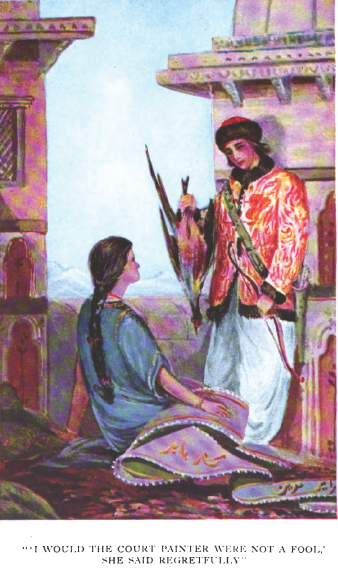Transcriber's Notes:
1. Page scan source:
http://books.google.com/books?id=wNIMAAAAYAAJ
(Harvard University)
KING-ERRANT

"I would the court painter were not a fool," she saidregretfully.
KING-ERRANT
BY
FLORA ANNIE STEEL
Author of "On the Face of the Waters," etc.
WITH FRONTISPIECE IN COLOR AND TWO
ILLUSTRATIONS IN BLACK-AND-WHITE
BY THE AUTHOR
NEW YORK
FREDERICK A. STOKES COMPANY
PUBLISHERS
Copyright, 1912, by
Frederick A. Stokes Company
All rights reserved, including that of translation into foreign
languages, including the Scandinavian.
PREFACE
This is not a novel, neither is it a history. It is the life-story ofa man, taken from his own memoirs.
"Tinker, tailor, soldier, sailor, gentleman, apothecary, ploughboy,thief."
So runs the jingle.
The hero of this book might have claimed as many personalities inhimself, for Zahir-ud-din Mahomed commonly called Babar, Emperor ofIndia, the first of the dynasty which we mis-name the Great Moghuls,was at one and the same time poet, painter, soldier, athlete,gentleman, musician, beggar and King.
He lived the most adventurous life a man ever lived, in the end of thefifteenth, the beginning of the sixteenth centuries; and he kept arecord of it.
On this record I have worked. Reading between the lines often, attimes supplying details that must have occurred, doing my best topresent, without flaw, the lovable, versatile, volatile soul whichwrote down its virtues and its vices, its successes and its failureswith equally unsparing truth, and equally invariable sense of honourand humour.
The incident of the crystal bowl, and the details of Babar'ssubsequent marriage to Mahâm (the woman who was to be to him whatAyesha was to Mahomed), are purely imaginary. I found it necessary tosupply some explanation of the curious coincidence in time of thisundoubted marriage with the pitifully brief romance of little CousinMa'asuma; for Babar was above all things affectionate. I trust myimagining fits in with the general tone of my hero's life.
If not, he will forgive me, I am sure. He forgave so many in life thathe will not grudge forgiveness in death, to his most ardent admirer.
F. A. Steel.
CONTENTS
BOOK I
Seed Time--1493 to 1504.
BOOK II
Blossom Time--1504 to 1511.